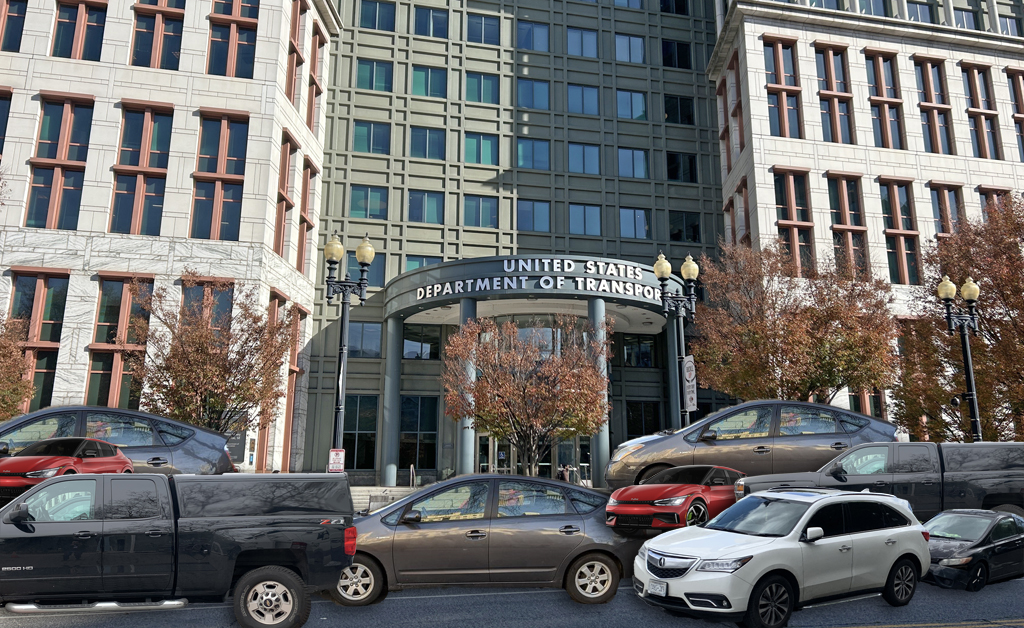As the Trump administration calls federal employees back into the office, U.S. DOT Secretary Sean Duffy will provide free parking at the agency's headquarters in a dense corner of Washington, a policy that is known to encourage driving by employees who otherwise would take transit — and inflict more congestion, emissions, and traffic violence on surrounding communities.
Previously, workers paid $155 a month to park at the U.S. DOT's Southeast Washington offices — and spaces were prioritized for people with disabilities, as well as carpoolers and those who need cars to perform their job functions. Now, all of the spaces will be given out for free, but only to those who win a "fair and unbiased" annual lottery for a limited supply of spots.
That policy, which may violate federal law, also runs runs counter to the District's own policies to encourage more sustainable commuting and curb the deleterious effects of cars in the nation's dense, transit-rich nation's capital.
And it also violates decades of research by late academic Donald Shoup encapsulated in the title of his seminal text, "The High Cost of Free Parking."
"By giving away valuable downtown parking to their employees, the Trump administration further unmasks their motives and sends a message to our nation's transportation leaders to ignore impacts of car travel on cities struggling with congestion, pollution, and pedestrian fatalities," said a DOT employee, who spoke with Streetsblog anonymously because of possible repercussions at work.
Of course, DOT is far from the only employer to give at least some employees free parking — and many communities essentially treat car storage as a basic benefit for all workers, by requiring most employers to build big lots by law.
Experts say, though, that there's growing recognition that free parking, much like underpriced driving, carries steep costs for local communities and commuters, even if we choose not to recognize them.
"I do think that this is of a piece with some other attitudes of this administration towards [transportation] economics," said Daniel Herriges of the Parking Reform Network. "I think about the response to congestion pricing in New York City; the rhetoric from the administration in trying to kill congestion pricing was basically, 'This is unfair to drivers.' But the reality is, you're going to pay one way or another. You're going to pay in time and hassle; you're going to pay in uncertainty that you can even get where you need to get.
"Or instead, you can pay a congestion charge that helps rationalize the demand for a very limited amount of motor vehicle access to a dense, crowded space," Herriges continued. "Parking is similar. ... When you have something in limited supply, and you say you're offering it for free, well, it's not really free."
Herriges also points out that DOT's new policy may impose new costs on those who happily paid the previous parking fee because of mobility changes, job duties that made driving necessary, or for other personal reasons, since they'll now be competing for space with those who wouldn't drive if parking weren't free. And if those drivers lose the lottery, they'll be forced to find space in a crowded downtown where parking can easily run $30 a day.
Moreover, Herriges emphasizes that U.S. DOT can't easily increase parking supply to meet demand — at least without bulldozing everything that makes downtown D.C. a place worth living and working in.
"There are a handful of places in North America that basically would cease to function if everybody who works there drove in every day ... and I would say that the core of Washington, D.C. is absolutely one of those places," he added. "If everyone drove a car and parked a car [there], you would have to pave the whole city."
In recognition of this basic reality, D.C. lawmakers passed a law in 2022 requiring all workplaces with 20 employees or more to provide "cash-outs" to workers who turn down their company-sponsored parking benefits, in amounts equivalent to the market value of the spot they're forgoing.
Workplaces that own their own lots like the federal government, though, were held exempt, removing a powerful incentive for employers in transit-rich neighborhoods to stop offering parking to anyone and putting their lots to more productive use.
Even if America's top transportation officials are unlikely to go that far, Herriges says the least they could do is encourage their employees to decide whether a car commute is right for them by pricing parking commensurate with its actual value, and to pick a cheaper mode if the cost is just too high.
"[If DOT wanted] to set a good model, they would offer good leadership to every private entity and public agency making transportation decisions by demonstrating that they understand the economics of transportation — and the very real space constraints around transportation," added Herriges. "I think this policy demonstrates that they are fairly clueless about that."
US DOT did not return requests for comment.






